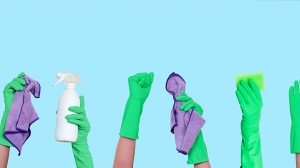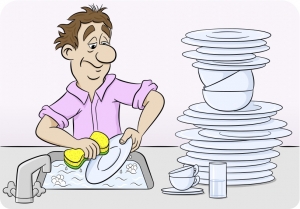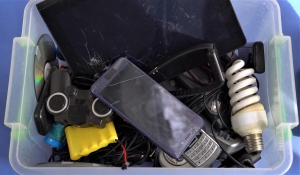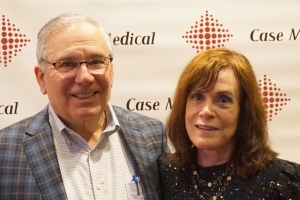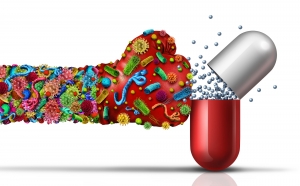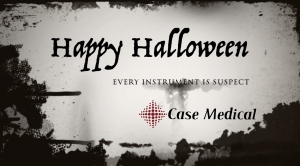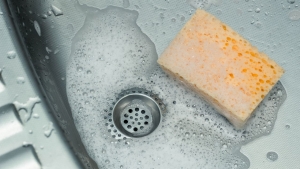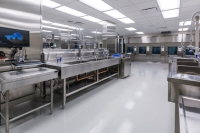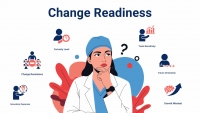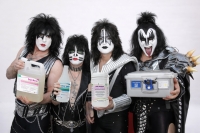Keep Cleaning with Soap and Water
Cleaning helps prevent infection by physically removing germs, dirt, and other debris from surfaces and objects. This removal significantly reduces the number of germs available to spread, making it less likely that individuals wi
It's All About the Rinse
Let’s talk about rinsing, whether its dishes, your hair, salad fixings or medical devices. Doesn’t sound all that glamorous does it? Right up there with taking out the trash and many other chores that need to be done. That’s why they’re called chores after all. Truth is rinsing is really, really important, and yet is often overlooked or simply not done well enough because it takes time...
Doing Business in a Sustainable and Non-Toxic Way
Every day seems to bring a new natural disaster or calamity, wildfires burning up New Mexico, western reservoirs drained to their lowest levels ever, extreme weather, flooding and landslides around the globe, can it get any worse? In a word, YES, yes it can if we don’t also stop poisoning ourselves with chemicals and products toxic to both humans and the environment.
Perservation Past & Present
Gels can preserve tissue and bioburden under a tough to remove clear coating. Jurassic Park, the book and movie was based on the notion that mosquitos were so well persevered in amber that dinosaur DNA could be recovered after millions of years. Well, pre-cleaning gels work much the same way, after a short time a sticky skin forms on the gel, trapping the debris beneath and becoming virtually impervious to cleaning. Enter the pre-cleaning gel, easy to use, and convenient, made to prevent soil from drying onto used instruments; is it wet or just an illusion?
A Holiday Tale about what Case Medical can do for SPD all the year through
T’was the night before surgery... And all through the SPD every set was in blue wrap as far as the eye could see. The peel packs were sorted for surgery with care… In hopes that the surgeon soon would be there.
Prepare for Obsolescence... For Today and Tomorrow
The Year Was 1924: The American car market was reaching its saturation point, when everyone who wanted and could afford a car had one. To deal with the problem of slowing sales of new cars an executive at General Motors came up with annual model-year design changes. The idea was to convince car owners to buy new cars every year, ...
Reward and Recognition... Together at Last
1992 Trivia, History and Fun Facts: The Top Song was I Will Always Love You by Whitney Houston, Johnny Carson was host of the “Tonight Show”, Elle Macpherson was THE fashion icon, and Case Medical is started by Marcia Frieze and her husband Allan. Looking Back; a lot has changed in 30 years, the music we listen to, trends and style in fashion, even the long running “Tonight Show” has had 2 new hosts since 1992. But you know what hasn’t changed in all that time? Case Medical’s commitment to putting patients and people first with products that perform better, last longer and are more ecologically sustainable than the rest. Back in 1992, before recycling was even a thing, and global warming were two words never paired together, Case Medical was making its products from 100%...
The Crisis of Antimicrobial Resistance and a Tripledemic, Too
A Global Health Emergency - Last week marked the beginning of World Antimicrobial Awareness Week. It was also a week when we learned that the virus which causes COVID-19 has continued to evolve into new subvariants. In fact, two of them have been detected in all 48 continental U.S. states. The U.S. Centers for Disease Control and Prevention (CDC) estimated that Omicron subvariants BQ.1 and BQ.1.1 account for nearly half of the COVID-19...
Halloween Scary Movie
It is late October, a time when apples are pressed into cider, leaves turn to vibrant autumn colors and Halloween horror movies scare and thrill audiences. While the names of monsters, ghosts and ghouls in these movies change, there are some recurring themes that are common to all of them including dangers lurking in hidden places, unexpected twists, secret weapons and of course, sequels. In a horror movie starring SPD professionals ...
The dirty truth about what is lurking in a sponge
Sponges may not be the best way to pre-treat endoscopes at patient’s bedside. There are 54 billion bacterial cells on a single cubic centimeter of the average kitchen sponge. They are breeding grounds for all types of germs and bacteria. A common sponge’s spatial partitioning – the way it’s divided into different sectors of various sizes – caters to bacteria that prefer isolated environments and those that prefer to be around other organisms as well, making it the best of both worlds for microbial communities.


